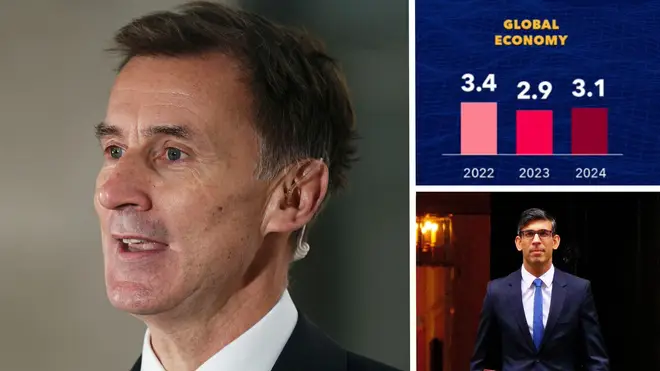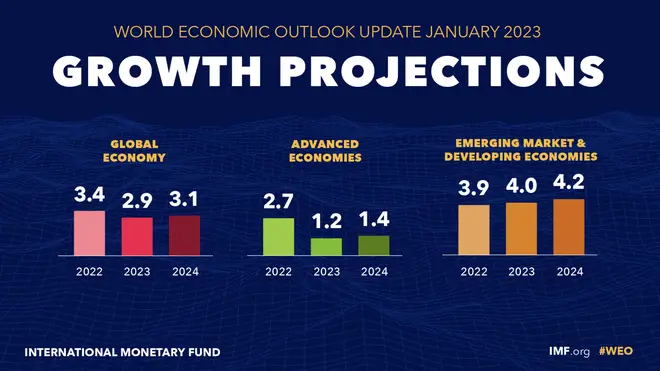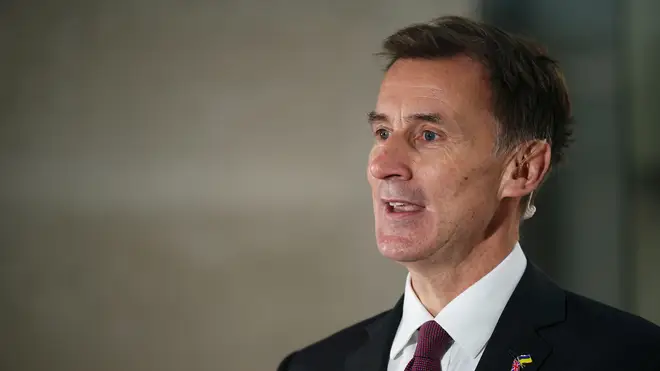
Nick Abbot 12am - 1am
31 January 2023, 07:05 | Updated: 31 January 2023, 07:25

The UK has been tipped to have the weakest major economy in the world in 2023, becoming the only G7 nation to shrink.
Britain's economy will slam into reverse as the cost of living crisis hits households hard, the International Monetary Fund (IMF) warned.
It will fall behind the likes of Russia as soaring inflation and higher interest rates take their toll, according to the latest World Economic Outlook update.
The IMF predicted a GDP contraction of 0.6% against the 0.3% growth pencilled in last October.
But it nudged up its outlook for UK growth in 2024 to 0.9%, up from the 0.6% expansion previously forecast.
The grim outlook also puts the UK far behind its counterparts in the G7 group of advanced nations, with it becoming the only country - across advanced and emerging economies - expected by the IMF to suffer a year of declining GDP.
Among the other G7 nations, the IMF's 2023 GDP predictions show growth of 1.4% in the United States, 0.1% in Germany, 0.7% in France, 0.6% in Italy, 1.8% in Japan and 1.5% in Canada.
It comes against a backdrop of public sector strikes over pay and predictions that the UK is heading for a recession, with inflation still standing at more than 10%.
Meanwhile, PM Rishi Sunak has been hailing "huge strides in harnessing Brexit freedoms" ahead of the third anniversary.
He said: “This is just the beginning of our plans to deliver on our five priorities, including growing the economy so we can create better paid jobs, and I’m determined to ensure the benefits of Brexit continue to empower communities and businesses right across the country.”
Read more: Government has 'hollowed out and underfunded' the British army, defence secretary Ben Wallace admits

Ex-Bank of England governor Mark Carney tells Andrew Marr about the state of the British economy
Chief economist for the IMF, Pierre-Olivier Gourinchas, explained there were three primary factors motivating the UK's economic outlook.
"First, there is exposure to natural gas... we've had a very sharp increase in energy prices in the UK. There is a larger share of energy that is coming from natural gas, with a higher pass-through to final consumers," he said.
"The UK's employment levels have also not recovered to pre-pandemic levels. This is a situation where you have a very, very tight labour market but you have an economy that has not re-absorbed into employment as many people as it had before. That means there is less output, less production.
"The third is that there is a very sharp monetary tightening because inflation has been very elevated, that's a side effect of this high pass-through of energy prices.
"Inflation was 9.1% last year, and it's expected to actually remain quite high in this coming year at 8.2% (so) the Bank of England has started tightening.
"The UK has a fairly high share of adjustable rate mortgages. So when the Bank of England starts increasing rates, it feeds into the mortgage rates that mortgage holders are paying, and that is also weighing down economic activity."

Chancellor Jeremy Hunt said: “The Governor of the Bank of England recently said that any UK recession this year is likely to be shallower than previously predicted, however these figures confirm we are not immune to the pressures hitting nearly all advanced economies.
“Short-term challenges should not obscure our long-term prospects - the UK outperformed many forecasts last year, and if we stick to our plan to halve inflation, the UK is still predicted to grow faster than Germany and Japan over the coming years."

Labour said the government still needed to do more to improve Britain's economy.
Shadow Chancellor Rachel Reeves said: "Britain has huge potential - but too many signs are pointing towards really difficult times for our economy, leaving us lagging behind our peers.
"The government should be doing all it can to make our economy stronger and to get it growing.
"It is the only way that we can move beyond lurching from crisis to crisis as we have been for far too long.
"Labour has a proper plan for growth that will get our economy back on track. Our Green Prosperity Plan and our active partnership with business will get our economy growing so we can get out of this spiral and onto a better path."